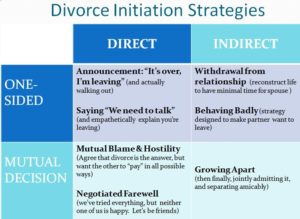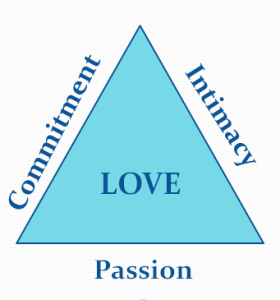Avoid Tragic Ending: Start With a Negotiated Farewell and Divorce Mediation
by Jamie Williamson, PhD
You know how happily married couples love to share the story of how they met, complete with teasing about fun little details? These are usually well-rehearsed tales, in which both spouses end up being heroes of their own, happily-ever-after love story.
Well, divorcing couples also want to share the story of their divorce, as well. Of course, divorcing spouses tell these tales separately and quite often provide dramatically different accounts of their path to divorce. Most of the time they aren’t lying or delusional. They just punctuate things differently. Here’s a common example:
Beth: I made the choice to stay home and raise my kids. My husband was a workaholic who would rather spend time working than with me and the kids. He’d make it home for family dinners but then left me alone to work in his office nearly every week night and Saturday he had his chores. On Sunday all he wanted to do was relax and watch a movie or the game. I was bored and felt unappreciated. So, I, of course found myself a real man who makes time for me and thinks I’m interesting and special. My husband was so clueless that he was actually surprised when I told him.
David: My wife wanted to be a “stay at home mom” and I agreed. But, to provide the kind of home and college savings we wanted, I had to work hard and continually advance in my career. I was happy to do it for her and the kids. It was a point of honor for me that I was able to provide for them. When I did get time at home, I wanted to tackle the “honey dos” and just hang out with her and the kids. But, she wanted to be wined and dined every weekend. I just didn’t want to have to try that hard to be happy. I love my wife and kids. I am a good dad and I was a faithful husband. I wanted a family life. But, that wasn’t enough for her. I was completely shocked when she announced she was leaving me for another guy.
As a Divorce & Family Mediator, I hear these stories all too often. In situations that involve emotional or physical abuse, one spouse often truly is the villain. But, most divorcing couples are like Beth and David – they lived in two different, parallel marriages and experienced two very different paths to the end of their relationship. These different perceptions and the vilification of each other typically metastasize into hardline positions that make the divorce process much more tedious and difficult than it has to be.
Imagine the fighting that ensued after Beth’s very one-sided announcement that she was leaving the marriage to be with another man. Imagine the long expensive court battle. Imagine the impact on their children and themselves.
So, how can this be avoided?
The most obvious answer is, once Beth and David first realized they were perpetually repeating the same conflict, they should have had the heartfelt conversations needed to promote mutual understanding and find a way to solve their truly solvable problem. If they weren’t able to do this themselves, they could have done it through a few sessions of Marriage Mediation, which if done well, can truly make your marriage work again.
But, of course, many people contemplating divorce think they’ve past the point of no return on their path to divorce. They believe that divorce is inevitable, and actually necessary for them to have a happy future.
When divorce seems like the best and only option, spouses can dramatically impact the quality of their divorce process by initiating the divorce using a strategy called the Negotiated Farewell. This approach is (a) private (does not involve family members, friends, or lovers); (b) direct (e.g. I’m unhappy); and, also (c) mutual because it allows the time required for both spouses to feel that the divorce is a mutual decision. During their Negotiated Farewell couples actually jointly construct the story of the end of their marriage.
The Negotiated Farewell isn’t for emotionally immature or combative people. It requires empathy, cooperation, the willingness to listen, and the parties have to care less about “winning” or being “right” and much, much more about building a stable post-divorce life for all involved, especially the children.
In the end, the couple’s publicly disclosed story of their divorce often is as simple as:
Beth and David: There is no bad guy. We’ve tried everything but neither one of us is happy. We decided to part as friends, and focus on being good parents to our kids so they still see us as a family – regardless of how our family might change overtime.
This may not be a fairy tale ending for Beth and David, but it is one where they can both be heroes in their divorce story and they both have a chance at a happily-ever-after divorce.
 If you are contemplating divorce (and are not afraid for your personal safety), look over the Divorce Initiation Strategies here. Think carefully before you use a strategy other than the Negotiated Farewell or the second most successful, “We need to talk”. If your partner won’t negotiate with you, this “We need to talk” approach is the best you can do. Any other strategy can quickly turn the story of your divorce into a tragedy.
If you are contemplating divorce (and are not afraid for your personal safety), look over the Divorce Initiation Strategies here. Think carefully before you use a strategy other than the Negotiated Farewell or the second most successful, “We need to talk”. If your partner won’t negotiate with you, this “We need to talk” approach is the best you can do. Any other strategy can quickly turn the story of your divorce into a tragedy.
If you truly want to part amicably, have a friendly divorce, avoid a messy, painful process, and focus on building a stable, happy future for all involved, then share this post with your spouse and suggest that the two of you participate in Divorce Mediation in order to work it out.
Done the Amity Mediation Workshop way, Divorce Mediation helps couples to recalibrate their approach to communicating with one another while they also negotiate all of their parenting and financial issues. That’s why we call it Amity Mediation Workshop.
Let me know if I can help.
 .
.